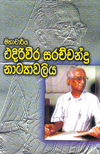|
|
|||||
|
A rare effort by journalist Mihindukula Many may not remember that Professor Ediriweera Sarachchandra's entry into Sinhala theatre was in 1943, when he wrote his first play, 'Mudalalige Peraliya' - an adaptation of Moliere's 'Le Bourgeois Gentilhomme'. It was produced by the University Sinhalese Society and was first staged in King George's Hall on December 16, 1943. Veteran journalist Sunil Mihindukula has unearthed this information in his latest publication 'Mahacharya Ediriweera Sarachchandra Naatyavaliya' - a brief history of Dr. Sarachchandra's dramas over 45 years. Though Mihindukula claims his is not a research study, the information in the 100-page book is of much value to any student of Sinhala theatre.
A symbol of change Delivering the keynote address at the launch, Prof. Tissa Kariyawasam described Sarachchandra as "a symbol of change". Born to a middle class family in Akmeemana in the south, he first learnt Pali from his mother's brother who was a monk. Since his father, a postmaster, was transferred from one station to another, Sarachchandra had to change schools as well as the subjects he learnt. As a student of University College, he studied Indo-Aryan languages (Pali, Sanskrit and Sinhalese). He also developed an interest in oriental music.
Tracing the maestro’s role in the development of drama here, Tissa said Sarachchandra first thought that in the absence of original plays in the 1940s, Sinhala drama should be based on translations and adaptations of foreign plays. Disappointed with Hungarian dramatist Newan Jubal's production of 'Veda Hatana' Sarachchandra had publicly said that Sinhala theatre cannot go forward if it was dependent on foreign plays. This was the time he was exposed to folk traditions in the country. He wrote 'The Folk Drama in Ceylon' in 1954 . His radio play 'Rattaran' showed the influence of low-country 'thovil' and devil dancing. "Having discovered that 'drama was the thing’ in his travels to Europe and America, his travels in the East made him realise that drama was a mix of song, dance, music and performance. He wrote 'Maname' in 1955 based on these findings," Tissa said. Sarachchandra who until then was committed to dialogue drama changed to stylised drama based on the traditional 'nadagam' style. |
|||||
Copyright © 2006 Wijeya Newspapers
Ltd. All rights reserved. |
